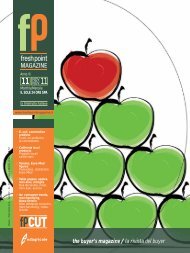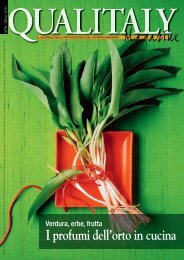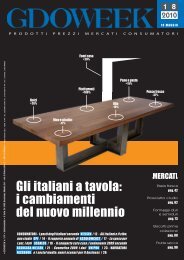Fresh Point Magazine - B2B24 - Il Sole 24 Ore
Fresh Point Magazine - B2B24 - Il Sole 24 Ore
Fresh Point Magazine - B2B24 - Il Sole 24 Ore
You also want an ePaper? Increase the reach of your titles
YUMPU automatically turns print PDFs into web optimized ePapers that Google loves.
market/Piedmont & Lombardy<br />
mercato/Piemonte e Lombardia<br />
July collapsed in the wake of the Escherichia coli scare,<br />
whereas those of tomato and cauliflower held up well”.<br />
Taking a different tack<br />
We then shifted our glance to the produce sector in<br />
Lombardy and asked Tiziano Caprioli, the head of<br />
Opo Bellaguarda, a producer organisation with over a<br />
hundred members growing mainly melon, watermelon<br />
and squash but also pear, bell pepper and aubergine,<br />
for his view. He didn’t mince his words.<br />
“Take pear, for example – he said. – The market is<br />
weak and there’s no end in sight to the doldrums. We<br />
just about broke even with melon, but watermelon<br />
was a disaster because of the bad weather during last<br />
summer’s growing season. We just don’t know what<br />
to expect this year. Indeed, although you often hear<br />
that things will turn around, the market only wants to<br />
know the price. Right now, we just wan to know if<br />
there’s any hope for growers who focus on quality and<br />
invest in advanced management practices and equipment.<br />
That’s really why we went to Fruit Logistica<br />
2012 in the first place”.<br />
There’s also news about what’s happening with producer<br />
organisations. The new year started off well for<br />
Uno Lombardia, an umbrella group that increased<br />
membership of associated POs from nine to twelve,<br />
strengthening its position as one of the leaders in the<br />
country’s produce industry.<br />
(English version by David Verzoni)<br />
Good news for Piedmont’s sweet chestnut crop: its most pernicious pest, the gall<br />
wasp, is being brought under control after years of bio-control efforts.<br />
Buone notizie da Piemonte per la castagna: la piaga degli ultimi anni per questo frutto, il<br />
cinipide galligeno, sta regredendo dopo anni di lotta biologica.<br />
20 <strong>Fresh</strong> <strong>Point</strong> <strong>Magazine</strong> n.3 – march/marzo 2012<br />
so Sacchetto, infatti, ha detto che dopo anni di lotta biologica,<br />
il cinipide galligeno, vera e propria piaga degli<br />
ultimi anni per questo frutto, sta sensibilmente regredendo.<br />
“Per il kiwi – ha aggiunto Carlo Manzo, direttore di<br />
Ortofruit Italia – non ci sono problemi di prodotto, ma di<br />
consumi. Si è verificata una flessione a livello europeo,<br />
che si può spiegare in parte con una minore disponibilità<br />
economica da parte delle famiglie. L’andamento delle<br />
mele mostra invece una maggiore linearità. Per affrontare<br />
questa situazione cerchiamo di costruire un programma<br />
commerciale andando sia in Europa sia in America<br />
del Nord e del Sud, senza escludere peraltro l’estremo<br />
Oriente”.<br />
Se altalenante è dunque il bilancio per alcune delle principali<br />
varietà di frutta prodotte da Ortofruit Italia, così lo<br />
è pure sul fronte degli orticoli, che rappresentano il 20%<br />
della produzione aziendale.<br />
“Premesso che non è ancora possibile fare alcuna<br />
previsione per il 2012 – ha detto Manzo – per il 2011<br />
l’andamento del mercato è dipeso molto dal periodo.<br />
Ad esempio, dopo il caso Escherichia coli, a giugno e<br />
luglio non c’è stata vendita di zucchine e cetrioli.<br />
Tuttavia, varietà come pomodori e cavolfiori si sono<br />
difese”.<br />
In cerca di strategie<br />
Sul fronte lombardo, il direttore di Opo Bellaguarda<br />
(organizzazione di produttori con oltre 100 soci, specializzata<br />
soprattutto in meloni, angurie e<br />
zucche, ma anche pere, peperoni e<br />
melanzane), Tiziano Caprioli, non ha<br />
usato mezzi termini.<br />
“Per quanto riguarda le pere – ha detto –<br />
il mercato langue e continua a languire.<br />
Con i meloni, siamo riusciti a recuperare i<br />
costi, con le angurie è stato un disastro, a<br />
causa dell’andamento climatico non favorevole<br />
dell’estate scorsa. Per il futuro non<br />
so cosa aspettarmi: anche se spesso<br />
viene dichiarato l’opposto, il mercato<br />
guarda soltanto al prezzo. In questo<br />
momento, ci interessa capire se c’è speranza<br />
per chi produce qualità e investe in<br />
tecniche e strutture avanzate. La nostra<br />
partecipazione a Fruit Logistica 2012 è<br />
stata motivata anche da questo”.<br />
Infine, sempre sul fronte delle organizzazioni<br />
di produttori, il 2012 è iniziato all’insegna<br />
di altre aggregazioni. L’Aop Uno<br />
Lombardia, associazione di organizzazioni<br />
di produttori, ha incrementato il nume-<br />
ro delle Op associate, passando da nove<br />
a dodici e affermandosi quindi sempre più<br />
come una delle realtà nazionali più importanti<br />
nel settore ortofrutticolo.

















